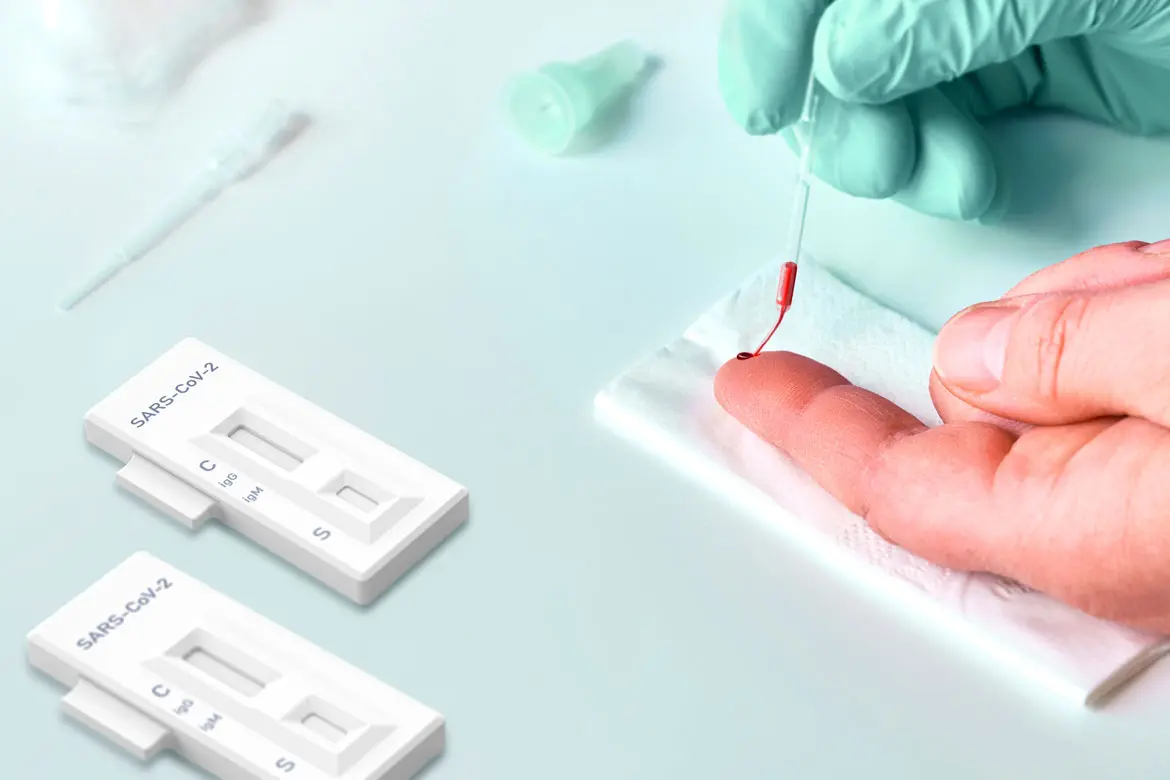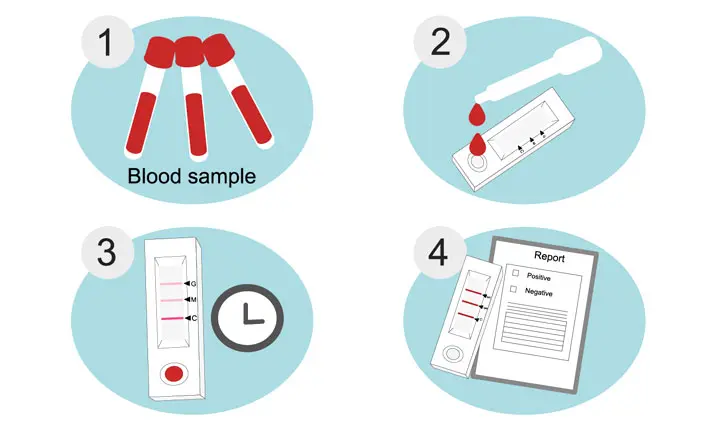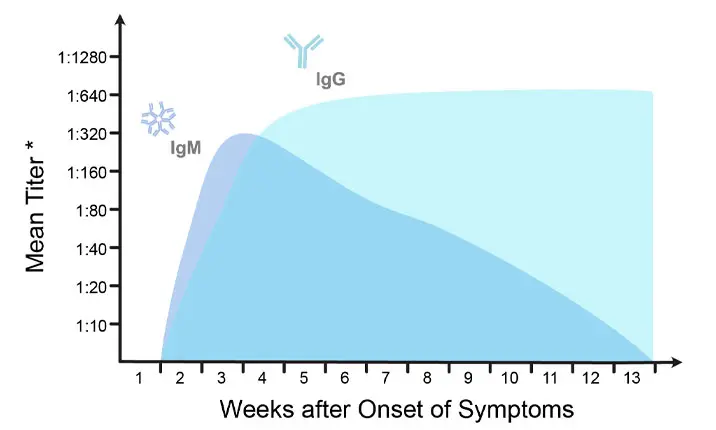-
-
Khu vực chăm sóc và điều trị


Nguồn: Getty Images
Tổng quan hơn Tìm hiểu về xét nghiệm huyết thanh COVID-19
Cập nhật lần cuối: 25 Tháng Tám 2022 | 5 phút - Thời gian đọc
Không chắc liệu trước đây bạn có từng bị nhiễm COVID-19 hay không? Chà, có một cách giúp bạn tìm hiểu điều này. Tìm hiểu thêm về xét nghiệm huyết thanh kháng thể đối với COVID-19 và những gì phương thức xét nghiệm này có thể thực hiện.
Bạn có thể biết một ai đó từng tiếp xúc với COVID-19 và thậm chí có ho, sốt và đau họng nặng trong một vài ngày, nhưng kết quả xét nghiệm nhanh kháng nguyên (ART) vẫn cho kết quả âm tính.
Bạn có thể nghĩ rằng thật khó hiểu, thực tế là thật đáng ngạc nhiên, làm sao một người có thể miễn dịch với virus mặc dù đã tiếp xúc gần gũi và kéo dài với một người thực sự bị nhiễm.
Vậy thì đây liệu có phải là một trường hợp mắc COVID-19, hay chuỗi kết quả xét nghiệm ART này là một loạt các kết quả âm tính giả (false negative)?
Dưới đây là một cách thức để giải quyết vướng mắc này: xét nghiệm huyết thanh kháng thể của COVID-19. Khác với xét nghiệm ART hoặc xét nghiệm phản ứng chuỗi polymerase (PCR), xét nghiệm huyết thanh kháng thể không cho thấy liệu bạn hiện có đang bị nhiễm COVID-19 hay không. Thay vào đó, nó giúp phát hiện xem trước đây bạn có từng nhiễm phải COVID-19 hay không bằng cách phát hiện kháng thể của virus trong dòng máu của bạn.
Bác sĩ Serene Wee, Bác sĩ Đa Khoa tại Phòng khám Parkway Shenton trên đường Robinson Road sẻ chia sẻ thêm về xét nghiệm huyết thanh kháng thể của COVID-19, cách hoạt động của nó, và nhiều loại xét nghiệm khác nhau mà bạn có thể thực hiện tùy vào nhu cầu của bản thân.
Xét nghiệm huyết thanh kháng thể của COVID-19 là gì?
Xét nghiệm huyết thanh kháng thể của COVID-19 bao gồm một xét nghiệm máu được thực hiện nhằm phát hiện sự từng nhiễm COVID-19 trước đây.
Nhưng điều này diễn ra như thế nào? Chúng tôi sẽ nêu chi tiết quá trình bên dưới.
Xét nghiệm huyết thanh kháng thể của COVID-19 phát hiện kháng thể
Xét nghiệm huyết thanh kháng thể của COVID-19 phát hiện kháng thể trong dòng máu nhằm xác định sự xuất hiện của sự từng nhiễm COVID trước đây.
Kháng thể có chức năng chống lại các virus, chẳng hạn như COVID-19
Kháng thể là các protein hình chữ Y trong dòng máu của chúng ta được hệ miễn dịch sản sinh ra nhằm đáp ứng lại một kháng nguyên hoặc vật thể lạ nào đó, ví dụ như vi khuẩn. Kháng thể cũng có thể được đưa vào cơ thể thông qua việc chủng ngừa.
Để chiến đấu và bài tiết kháng nguyên, kháng thể sẽ gắn chặt vào chúng.
Tương tự, sau khi bị nhiễm bởi virus SARS-CoV-2 (COVID-19) và tiếp xúc với kháng nguyên từ virus này, cơ thể bạn sẽ sản sinh ra kháng thể giúp chiến đấu và bài tiết virus này ra khỏi cơ thể bạn.
Kháng Thể được sản xuất trong suốt giai đoạn từng nhiễm bệnh vẫn tồn tại trong dòng máu, và do đó có thể được phát hiện trong giai đoạn xét nghiệm huyết thanh kháng thể
Kháng thể tiếp tục tồn tại trong dòng máu sau khi đã bình phục từ virus. Điều này hỗ trợ đảm bảo rằng nếu như lại được tiếp xúc với kháng nguyên tương tự lần nữa, ví dụ như những kháng nguyên đến từ virus COVID-19, cơ thể đã được chuẩn bị để đối đầu với nó hiệu quả hơn.
Trường Hợp Sử dụng Xét Nghiệm Huyết Thanh Kháng Thể của COVID-19
Trải qua xét nghiệm huyết thanh kháng thể của COVID-19 có thể giúp bạn tìm hiểu liệu trước đây bạn đã từng mắc phải COVID-19 hay chưa. Dưới đây là lý do tại sao điều này có thể hữu ích:
- Nếu một ca từng nhiễm COVID-19 trước đây được phát hiện thông qua xét nghiệm huyết thanh kháng thể, được khuyên nên trì hoãn việc trải qua thủ thuật 7 tuần kể từ lúc nhiễm bệnh để ngăn chặn biến chứng sau phẫu thuật.
- Xét nghiệm huyết thanh kháng thể có thể hỗ trợ chuẩn đoán hội chứng viêm đa hệ thống ở trẻ em ( MIS-C), do nhiều trẻ em mắc hội chứng MIS-C có kháng thể COVID-19.
- Tất cả các cá nhân* đã được chủng ngừa tại nước ngoài sẽ cần phải xác minh hồ sơ chủng ngừa của mình. Một xét nghiệm huyết thanh kháng thể có thể hỗ trợ bạn làm điều này, trừ khi bạn xuất trình được chứng chỉ chủng ngừa có khả năng xác thực kỹ thuật số, miễn trừ yêu cầu xét nghiệm.
- Bao gồm Công dân Singapore, Cư dân Thường trú Singapore, Người Được Cấp Thẻ Lao Động Dài Hạn, và Người Được Cấp Thẻ Ngắn hạn đang ở Singapore lâu hơn 30 ngày.
Tìm Hiểu Kết Quả Xét Nghiệm Huyết Thanh Kháng Thể của COVID-19
Ý nghĩa của một kết quả xét nghiệm huyết thanh kháng thể của COVID-19 là dương tính?
Một kết quả dương tính sẽ có nghĩa là có kháng thể COVID-19 được phát hiện trong mẫu máu. Điều này sẽ chỉ ra một ca từng nhiễm COVID-19 trước đó. Kết quả này cũng có thể là một kết quả dương tính giả (false positive), có thể là hậu quả của một xét nghiệm không chính xác, hoặc do các kháng thể được phát hiện là các kháng thể thuộc về một loại virus có mối liên hệ gần gũi.
Hiện tại, kiến thức về kháng thể của COVID-19 và mức độ chúng có thể bảo vệ cá thể khỏi nhiễm COVID-19 vẫn chưa được hiểu rõ nhiều.
Chính vì thế, xét nghiệm huyết thanh kháng thể không nên được sử dụng như một chỉ báo về tính miễn dịch không nhiễm hoặc không tái nhiễm COVID-19.
Ý nghĩa của một kết quả xét nghiệm huyết thanh kháng thể của COVID-19 là âm tính
Điều này sẽ có nghĩa là không có kháng thể COVID-19 nào trong mẫu máu được lấy, vì vậy bạn có thể đã không bị nhiễm COVID-19 trong quá khứ. Kết quả này cũng có thể là một kết quả âm tính giả (false negative), do một xét nghiệm bị trục trặc, hoặc do xét nghiệm được thực hiện trước khi các kháng thể đủ (thường 2-3 tuần được yêu cầu để đạt được điều này) được cơ thể sản xuất để được phát hiện trong quá trình xét nghiệm.
Những Loại Xét Nghiệm Huyết Thanh Kháng Thể của COVID-19 Khác Nhau là gì?
Dưới đây là 4 loại xét nghiệm huyết thanh kháng thể của COVID-19 hiện có ở Singapore
1. Xét Nghiệm Tổng Kháng Thể SARS-CoV-2
Đây là một xét nghiệm kháng thể không cụ thể, có khả năng phát hiện IgM (giai đoạn đầu) và IgG (giai đoạn cuối) kháng thể, những kháng thể hình thành để đáp ứng lại virus SARS-CoV-2. IgM and IgG là các immunoglobulin hoặc kháng thể trong hệ miễn dịch của chúng ta nhằm hỗ trợ bài tiết virus ra khỏi cơ thể. IgM được sản xuất ngay lập tức sau khi một kháng nguyên tiến nhập vào cơ thể và biến mất sau một vài tuần, trong khi đó IgG được sản xuất sau một thời gian kể từ lúc IgM sản sinh, và tồn tại lâu hơn IgM trong dòng máu.
*Chỉ số hiệu giá trung bình (mean titer) chỉ tới nồng độ các kháng thể hiện diện trong dòng máu.
2. Xét Nghiệm Anti-SARS-CoV-2 S Kháng Thể
Xét nghiệm này sẽ phát hiện các kháng thể định lượng chống lại miền gắn kết thụ thể (receptor binding domain -RBD) đinh (splike - S) của SARS-CoV-2. Công dụng chính của xét nghiệm này là nhằm phát hiện và định lượng phản ứng miễn dịch gây ra bởi việc chủng ngừa, bằng cách mang đến cho bạn một giá trị bằng số về múc độ các kháng thể hiện diện trong dòng máu của bạn.
3. Xét Nghiệm Anti-SARS-CoV-2 N Kháng Thể
Xét nghiệm này sẽ phát hiện các kháng thể định tính đối với protein nucleocapsid (N) của virus SARS-CoV-2. Nó sẽ phát hiện sự xuất hiện của các kháng thể trong dòng máu, hơn là mức độ kháng thể hiện diện. Công dụng chính của xét nghiệm này là nhằm phát hiện phản ứng miễn dịch của cơ thể diễn ra sau một ca nhiễm bệnh tự nhiên.
4. Xét Nghiệm SARS-CoV-2 cPass
Xét nghiệm này được dự định nhằm phát hiện định tính các kháng thể trung hòa (neutralising antibodies) chống lại virus SARS-CoV-2. Công dụng chính của xét nghiệm này là nhằm hỗ trợ xác định các cá thể có kháng thể miễn dịch đối với SARS-CoV-2 hoặc được sản xuất sau khi nhiễm bệnh hoặc chủng ngừa. Một kết quả dương tính (30% trở lên) chỉ ra sự hiện diện của kháng thể trung hòa SARS-CoV-2.
Xét nghiệm huyết thanh kháng thể có thể hỗ trợ bạn tìm hiểu liệu trước đây bạn có phải đã từng nhiễm COVID-19, điều này có thể mang lại các lợi ích cho nhiều mục đích khác nhau. Tuy nhiên, cần phải lưu ý rằng hình thức xét nghiệm này cũng có những giới hạn của nó. Bên cạnh khả năng cho ra kết quả giả, xét nghiệm huyết thanh kháng thể của COVID-19 không nên được xem là một chỉ báo cho biết bạn đang có khả năng miễn dịch khỏi tái nhiễm COVID-19.
Chính vì thế, việc tiếp tục áp dụng các biện pháp nhằm giảm nguy cơ nhiễm và ngăn ngừa việc lây nhiễm đến người khác khi chúng ta tiếp tục chung sống với COVID-19.
Để tìm hiểu thêm chi tiết về các xét nghiệm huyết thanh kháng thể có tại các phòng khám của chúng tôi, xác định vị trí một phòng khám của Parkway Shenton gần bạn và gọi điện thoại trao đổi với chúng tôi nhằm lên lịch thực hiện một xét nghiệm huyết thanh kháng thể.
What to know about antibodies? Medical News Today. Retrieved on 2 August 2022 from https://www.medicalnewstoday.com/articles/what-is-an-antibody
What is serology? Healthline. Retrieved on 2 August 2022 from https://www.healthline.com/health/serology.
Why you should delay surgery after a COVID-19 diagnosis. Healthline. Retrieved on 2 August 2022 from https://www.healthline.com/health-news/why-you-should-delay-surgery-for-7-weeks-after-a-covid-19-diagnosis
FAQs - Post Vaccination Matters. Ministry of Health. Retrieved on 2 August 2022 from https://www.moh.gov.sg/covid-19/vaccination/faqs---post-vaccination-matters
COVID-19 antibody testing. Mayo Clinic. Retrieved on 2 August 2022 from https://www.mayoclinic.org/tests-procedures/covid-19-antibody-testing/about/pac-20489696
What is serology? Healthline. Retrieved on 2 August 2022 from https://www.healthline.com/health/serology.
Why you should delay surgery after a COVID-19 diagnosis. Healthline. Retrieved on 2 August 2022 from https://www.healthline.com/health-news/why-you-should-delay-surgery-for-7-weeks-after-a-covid-19-diagnosis
FAQs - Post Vaccination Matters. Ministry of Health. Retrieved on 2 August 2022 from https://www.moh.gov.sg/covid-19/vaccination/faqs---post-vaccination-matters
COVID-19 antibody testing. Mayo Clinic. Retrieved on 2 August 2022 from https://www.mayoclinic.org/tests-procedures/covid-19-antibody-testing/about/pac-20489696










